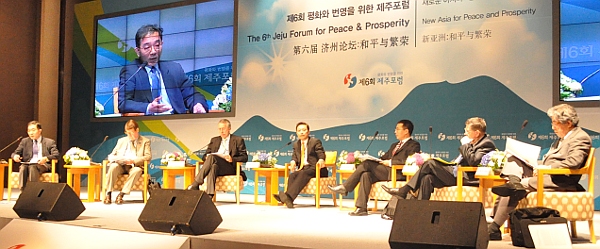- Dispatch 8 from the 6th Jeju Forum for Peace & Prosperity, May 27-29
 |
||
| ▲ From left, Lee Geun, Mark Clements Minton, Walter Klitz, moderator Kwak Seung Jun, Changhe Su, Evgeny Afansiev, and Masao Okonogi. Photo by Darryl Coote. | ||
On May 29, the final day of the 6th Jeju Forum for Peace & Prosperity, a panel of six experts on inter-Korean relations and human rights spoke about the possibility of a single Korea during the sixth Plenary Session, “Korean Reunification and New Opportunities.”
Keynote speaker Lee Geun, professor of the Graduate School of International Studies at Seoul National University, said that due to the gap of some 70 years since the peninsula was a single country, younger generations of South Koreans view the North as a foreign country.
“The concept of reunification is not a very natural concept anymore,” Lee said.
Lee argues that because of this situation, reunification will be very difficult; therefore he calls for the idea of reunification to be that of “a creative destruction,” which means instead of a single divided country becoming whole again, two countries integrate and become one.
The problems he foresees after the uniting of the two Koreas will not be the monetary costs which are so often discussed he said, but the “social, cultural, and psychological costs and benefits of reunification,” from merging the two, very different and distinct societies.
“I think that we could hardly be at a more unpromising time to be discussing reunification,” said Mark Clements Minton, president of the Korea Society, because South Korea is in “the worst diplomatic situation in over a decade.”
Minton says that due to the disappointments in negotiations at the six-party talks and the four-party talks, “it may be useful to look at our problems in dealing with North Korea in a different way.”
He suggests the creation of initiatives that directly deal with issues at the core of the inter-Korean divide.
“There seems no reason that a Pyongyang institute in Seoul or a Seoul institute in Pyongyang manned by former North South diplomats who have temporarily resigned from their official status … or perhaps supplemented by academic experts,” said Minton. This would address those core inter-Korean issues like the lack of a public display of mutual recognition and of the broken channel of communication, he said.
Walter Klitz, who had recently returned from North Korea, said “In order to achieve a peaceful reunification from my point of view it is strongly required to interrupt the loop of recrimination and to renounce the use of force.”
Klitz, director of the Friedrich Naumann Foundation for Liberty, referred to the visiting tours to Keumgangsan as a success in inter-Korean relations because “it is important to keep memories alive,” but he suggested this sort of cooperation could extend further into an economic realm.
The revenues generated from the Keumgangsan tours, he said, “are almost dispensable,” when considering China imported 4.6 million tons of coal from North Korea and 80,000 tons of molybdenum, which is used to create technology products.
“For a high tech country like South Korea this might be very interesting to deal with North Korea on Natural resources,” said Klitz.
Evgeny Afansiev, director general of the Ministry of Foreign Affairs of the Russian Federation’s Personnel Department concurred that presently the idea of reunification is less optimistic than a decade ago: “I would suggest if you look back on to this period so our panel would be more correctly be called reunification, not new opportunities but lost opportunities.”
He mentioned an anecdote from the 2000 North-South Summit, when Kim Jong Il reportedly only understood 70 percent of what South Korean President Kim Dae Jung said. “[This] shows how deep this difference between the two Korean states is,” said Afansiev.
For reunification to occur, he said, there needs to be international support, political elites in both Koreas and, most importantly, “support of the majority of the people in both states.”
Masao Okonogi, emeritus professor at Keio University’s Faculty of Law and Graduate Studies, stated that the situation as of late has changed since North Korea now has a nuclear program. Speaking in Korean, he asserted that due to the North’s relationship with China, it will not merge with its southern neighbor.
“China is trying to lead North Korea towards a new economy,” he said, and the way to counter this is to “increase economic relationships with North Korea.”
Darryl Coote darrylcoote@jejuweekly.com
<저작권자 © 제주위클리 무단전재 및 재배포금지>






